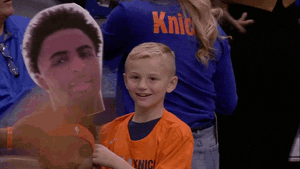Good read
Last week, before Frank Ntilikina set off back to New York, back to the Knicks and to the uncertainty that has crusted over his NBA career, he stopped by his old stomping grounds in Strasbourg. For Ntilikina, it was a return to his hometown in France, where his mother still lives, and where he can check in on his old team, the one he made his name with before the Knicks drafted him eighth overall in 2017.
Vincent Collet, the Strasbourg coach, has watched Ntilikina grow up. He coached the young guard in his last season in French Pro A League, before his NBA debut, and then again this summer as Ntilikina blossomed for the French national team during the World Cup in China. Ntilikina was a catalyst of France’s bronze medal run, helping slay the United States with two late jumpers in its epochal upset.
The performance raised eyebrows because it was so overtly different than the kind Ntilikina has brought to New York, where he has too often waffled and hemmed. In China, he was assertive on offense and demonstrative in post-game celebration. It was the player the Knicks have long hoped to see.
It was the player Collet waited for, too. The kind of player the coach had spent the summer pushing Ntilikina to be; prodding him to take risks and assume responsibility, and questioning him when he hesitated. On a team with several NBA players; those who, Collet says, implored Ntilikina to do more, the 21-year-old guard did just that.
So, in their last chat in Strasbourg, Collet left Ntilikina with a message.
“I told him he must keep going,” Collet told The Athletic. “He must take advantage of the World Cup. When you start the camp, you must show them you are not the same Frank anymore.”
That is the burden for Ntilikina now. When the Knicks start their training camp later this month, those sessions, like the year ahead, will be critical for him. The franchise brought in more talent this summer, creating even more competition for Ntilikina and even more reason not to play him, if head coach David Fizdale so chooses, with newly signed veterans on the roster along with the young peers he wrestled for playing time last season. And New York must decide by Oct. 31 whether to pick up his fourth-year option.
While Ntilikina popped in FIBA competition, he has spent the summer preparing for this pivotal campaign. He worked with trainer Tim Martin in Dallas, with Knicks coaches popping in. He was, Collet says, France’s most improved player from the start of the national team’s time together in July through the World Cup, coming off the bench at the start of the tournament and starting by its end.
Martin and Collet both believe that confidence and intent were key for Ntilikina. In Dallas, when Martin and Ntilikina got together in May, he had the guard focus on three umbrella points: shooting mechanics, mentality and goal-setting.
Collet pushed Ntilikina to be more aggressive — something he has struggled to be in New York. The French coach wanted Ntilikina to shoot whenever he was open and to attack the basket whenever he could. Over the course of the tournament, Collet says, Ntilikina obliged, shooting more frequently than he did in the NBA, even though he was surrounded by more talented teammates in Evan Fournier, Rudy Gobert and Nicolas Batum.
It was a continuation of what he heard from Martin.
“Every shot is 50/50 — it’s going in or it’s not,” Martin said. “But you have to take some of those shots to keep the defense honest.”
The lessons were reflected in Ntilikina’s number. While still not gaudy, he shot 51.6 percent on 2-pointers — a jump from the 38 percent in the NBA — and 33.3 percent on 3s — up from 30.5 for the Knicks. It was progress, at least, on a jump shot that has been highly inaccurate so far.
Ntilikina, Martin says, spent the summer focused on improving his shooting mechanics and footwork, watching film and prioritizing accuracy. Shooting in rhythm was a key, as was balance, with Martin redirecting his feet straight toward the rim on jumpers. Makes alone didn’t suffice. If Ntilikina did not swish a shot, it did not count.
“He had a tendency to shoot off-rhythm,” Martin said. “He’d pick up his dribble, but his feet would continue to move before his shot.”
Ntilikina may benefit from time and experience as much as anything else. He debuted for the Knicks as a wiry 19-year-old. Martin spoke of issues adjusting to the league, including a need to learn the NBA’s nomenclature.
Collet saw a player who was too unselfish — something he sees as untenable in the NBA — and Ntilikina has admitted to struggles calibrating his self-sufficiency and a team-friendlier mindset.
“I knew he was not completely ready to cope with the difficulties he will meet in the NBA,” Collet said. “He was 19 years old and he needed time. The problem when you get drafted is that you cannot refuse it, so you have to go.”
But Collet believes that Ntilikina is finding that understanding now. The young guard he has pushed since Strasbourg to make mistakes, he says, is finally willing. He saw it firsthand in China.
The win over Team USA could prove to be a career turning point. Ntilikina scored 11 points, was 5-of-9 shooting, and had three assists. He pushed the ball, looking for his shot first, occasionally, like a first quarter lay-up when he took the ball from the backcourt off a miss, saw an unsettled defense and went straight to the rim.
His fourth quarter jumper to tie the game at 76 was the highlight, but he drove France’s comeback from a seven-point deficit. Ntilikina has had a habit of stopping his penetration too early as he gets into the lane, but against USA, on successive possessions, he led a pick-and-roll and fed Gobert for a layup, and then caught the ball on the move and scored on a runner. When Kemba Walker closed out on him with 2:19 remaining, Ntilikina did not keep the ball moving. Instead, he resettled and drilled a jumper on him.
For him, it’s something fantastic,” Collet said. “Because Batum told me, for instance, that Kemba couldn’t believe that Frank could do that. I think that kind of a story could change his career. Now he knows.”
Collet sees an analog in Gobert’s development. The center played sparingly as a rookie in Utah, but the 2014 World Cup presaged a breakout season. Collet believes the same could ring true for Ntilikina, who was encouraged by his more established teammates. After the tournament, Fournier tweeted that Ntilikina simply needs an opportunity.
Ntilikina will have to find one in New York, on a roster with a backlog of guards and wings. After spending his first two years struggling to find consistency and an offensive verve, Ntilikina comes back riding a career high. Those who saw him up-close in the recent months believe his breakout is coming. Martin believes the World Cup was a boon for his psyche. Now, the Knicks must hope it will carry on.
“I think he is going to change,” Collet said. “I felt on the court this summer it is going to change. I think he understood he has no choice. He must force his personality.”




































